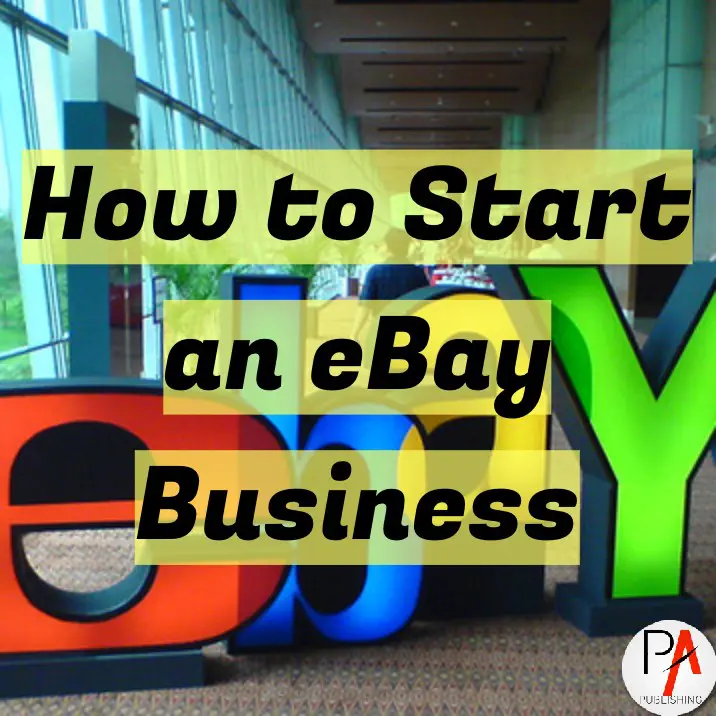How to start an eBay business: Starting an eBay business can be a lucrative venture, but it requires careful planning and execution to ensure success. With millions of people buying and selling on the platform daily, competition can be fierce. Therefore, aspiring entrepreneurs must have a solid strategy in place from the beginning.
This article will explore effective tactics to start an eBay business successfully – from identifying profitable product niches to establishing a strong online presence and providing exceptional customer service. Whether you’re looking to establish a full-time e-commerce career or earn extra income on the side, this guide will equip you with invaluable insights into starting strong on eBay. So let’s dive in and discover how you can lay the foundation for a thriving eBay enterprise!

Identifying Profitable Product Niches on eBay
When starting an eBay business, it is crucial to identify profitable product niches. Here are some tips to help you find lucrative opportunities:
- Research market trends: Explore current market trends and popular products on eBay. This will give you insights into what customers are looking for and what sells well.
- Analyze competition: Study your competitors’ listings and sales data to understand which products perform best in your chosen niche.
- Consider demand and supply: Look for products that have a high demand but low supply. This will allow you to charge higher prices and increase profitability.
- Target specific audiences: Identify niche markets within broader categories, such as pet accessories or vintage clothing, that cater to specific customer needs.
- Leverage customer feedback: Pay attention to customer reviews and feedback both on eBay and other platforms, as they can provide valuable insights into potential product niches with untapped opportunities.
How to start an eBay business: By following these strategies, you can start your eBay business strong by identifying profitable product niches that meet the demands of your target audience while minimizing competition within your chosen marketplace.
Researching and Analyzing Market Trends
To start your eBay business successfully, it’s crucial to research and analyze market trends. This will help you understand what products are in demand and how to price them competitively. Here are a few steps to get started:
- Identify popular categories: Begin by exploring eBay’s trending category list, which shows the top-selling product categories on the platform. This will give you an idea of what items are currently in high demand.
- Stay updated with current events: Keep an eye on current news and events as they can significantly impact consumer behavior and purchasing patterns. For instance, if there is a sudden surge in interest for sustainable products due to environmental concerns, consider selling eco-friendly items.
- Analyze competition: Study your competitors’ listings to gather insights about their pricing strategies, customer reviews, and item descriptions. You can differentiate yourself in the market by understanding their strengths and weaknesses.
By conducting thorough market research and analyzing trends effectively, you can make informed decisions about what products to sell on eBay – setting yourself up for success from the beginning of your journey into online entrepreneurship!
Creating a Solid Business Plan for Your eBay Venture
How to start an eBay business: Before diving into your eBay business, creating a solid business plan outlining your goals, targets, and strategies is crucial. This simple yet vital document will serve as your roadmap to success. Here are some key steps to consider when crafting an effective business plan:
- Identify Your Niche: Start by defining the specific products or services you want to offer on eBay. Research the market demand, competition, and potential profitability of your chosen niche.
- Set Clear Goals: Clearly define what you want to achieve with your eBay venture. Whether it’s generating a certain amount of monthly sales or expanding into new markets, having clear goals helps keep you focused and motivated.
- Understand Your Target Audience: Identify who your ideal customers are and how you can reach them effectively on eBay. Understanding their needs and preferences will enable you to tailor your listings and marketing efforts accordingly.
- Develop Pricing Strategies: Determine how you will price your products competitively while still making a profit. Consider factors such as sourcing costs, listing fees, shipping expenses, and customer expectations.
Formulate Marketing Plans: Plan out marketing strategies that align with its features.
- Optimize product listings with appropriate keywords for better visibility in search results.
- Leverage social media platforms like Instagram or Facebook Advertising invest in paid ads time-to-time.
Manage Inventory Effectively: Once selected, they need regular monitoring so policies don’t expire silently.
- Regular assessment forms should help make amendments if necessary
Setting Up Your eBay Store: A Step-by-Step Guide
Setting up your online store is one of the first steps to starting your eBay business. Here’s a step-by-step guide to help you get started:
- Choose a name for your store: Pick a name that reflects your brand and will be catchy for potential customers.
- Register as a seller on eBay: Sign up for an eBay account if you haven’t already done so, and complete the necessary registration information.
- Set up payment methods: Decide how you want to accept buyer payments – options include PayPal, credit cards, or bank transfers.
- Create product listings: Provide accurate descriptions, clear images, and competitive prices for each item you list in your store.
- Organize your inventory: Keep track of your available products using tools like inventory management software or spreadsheets.
Remember that starting an eBay business requires attention to detail and strategic planning! By following these steps, you’ll be well on your way to launching a successful online store.
Building a Strong Online Presence for Your eBay Business
Creating a strong online presence is essential for the success of your eBay business. Here are some key steps to help you establish and maintain a strong presence on the platform:
- Optimize your listings: Start by optimizing your product listings to improve their visibility in search results. Use relevant keywords in the title and description, provide accurate item details, and include high-quality images.
- Offer competitive pricing: Price your products competitively to attract more buyers. Research similar listings and adjust your prices accordingly. Consider offering discounts or promotions to stay ahead of the competition.
- Build trust with customers: Provide excellent customer service to build trust with buyers. Respond promptly to inquiries, address any concerns or issues effectively, and always strive for 100% positive feedback.
- Use social media: Leverage social media platforms like Facebook, Instagram, and Twitter to promote your eBay store and products. Engage with potential customers through engaging content, special offers, giveaways, and behind-the-scenes glimpses into your business.
Building an online presence takes time and effort—consistency is key! By following these steps consistently over time, you can solidify your brand’s reputation on eBay while attracting loyal customers who are confident in purchasing from you repeatedly.

Effective Listing Techniques to Increase Sales on eBay
Creating compelling listings that attract potential buyers and maximize sales is essential when selling on eBay. Here are some effective listing techniques to help you start your eBay business successfully:
- Accurate and Detailed Descriptions: Provide clear and concise descriptions of your items, including important details such as brand, size, condition, and any unique features. Use bullet points or short paragraphs to make the information easy to read.
- High-Quality Photos: Include high-resolution photos that showcase your products from different angles. A well-lit and clutter-free background helps draw attention to the item for sale.
- Competitive Pricing: Research similar products sold on eBay to determine a fair price for yours. Consider offering competitive pricing or discounts when starting out to attract customers.
- Clear Return Policy: Establishing a transparent return policy builds trust with buyers and can increase their confidence in making a purchase.
- Keyword Optimization: Incorporate relevant keywords into your titles, descriptions, and item specifics so that they appear in search results more frequently.
By implementing these listing techniques, you can improve the visibility of your items on eBay and increase the likelihood of successful sales.
Maximizing Your eBay Store’s Visibility and Reach
Optimizing Your eBay Store’s Visibility and Reach
To maximize your eBay store’s visibility and reach, there are several key strategies you can implement:
- Utilize relevant keywords: Research popular search terms related to your products and incorporate them into your listing titles, descriptions, and tags. This will help potential buyers find your listings more easily.
- Optimize product images: High-quality and visually appealing images attract more attention from shoppers. Make sure to use clear, well-lit photos that showcase the item from multiple angles.
- Offer competitive pricing: Regularly compare prices of similar items on eBay to ensure yours is competitive or even slightly lower. Price-conscious buyers are more likely to be drawn to affordable options.
4.Promote with social media: Leverage platforms like Facebook, Instagram, or Twitter to drive traffic to your eBay store by sharing links and engaging with potential customers.
5.Take advantage of cross-promotion: Use eBay’s promotional tools (e. g., “Related Items”) or consider partnering with other sellers in complementary niches for mutually beneficial promotions.
Pricing Strategies for Success on eBay
To maximize your success on eBay, it’s important to implement effective pricing strategies. Here are some key tips:
- Research your competition: Before setting prices for your products, take the time to research what similar items are selling for on eBay. This will help you gauge market demand and set competitive prices that attract buyers.
- Consider offering free shipping: Offering free shipping can increase the appeal of your listings and encourage more purchases. However, make sure to factor in the shipping cost when determining your overall pricing strategy.
- Utilize auction-style listings strategically: Auction-style listings can be a great way to create excitement and drive up prices for unique or high-demand items. However, they may not be suitable for every product category or item type.
- Use promotions and discounts wisely: Offer special promotions or discounts periodically to incentivize buyers and boost sales. Just make sure these discounts don’t eat into your profit margin too much.
Remember that finding the right pricing strategy takes time and experimentation – continuously monitor how different price points affect buyer behavior and adjust accordingly!
Providing Exceptional Customer Service on eBay
- Communicate promptly and efficiently with customers: Respond to inquiries and messages in a timely manner, addressing any questions or concerns they may have. Keep communication professional and friendly.
- Offer accurate product descriptions: Provide detailed information about the items you are selling, including specifications, condition, and any flaws or defects. Avoid exaggerations or misleading statements that could lead to customer dissatisfaction.
- Package items securely: Carefully pack items to prevent damage during shipping. Use appropriate packaging materials such as bubble wrap or packing peanuts when necessary. Clearly label packages with the recipient’s address for easy identification.
- Ship orders promptly: Expedite order processing by shipping items within one business day of receiving payment confirmation. Provide tracking numbers so customers can monitor the progress of their packages.
- Resolve issues proactively: If a customer encounters a problem with their purchase, take immediate action to rectify the situation. Offer refunds or replacements if necessary, ensuring customer satisfaction is prioritized at all times.
By following these steps, you can establish your eBay business as one that values exceptional customer service – an essential component of starting strong in this competitive marketplace.
Scaling and Growing Your eBay Business
1. Optimize your listings for search visibility:
Ensure your product titles, descriptions, and tags are relevant to buyers’ search. Use specific keywords that accurately describe your item.
2. Offer competitive pricing:
Research similar products to ensure your prices are competitive. Consider offering discounts or promotions to attract customers.
3. Provide exceptional customer service:
Respond quickly to buyer inquiries and address any issues promptly and professionally. Positive feedback can help build trust with potential customers.
4. Set up an inventory management system:
As your business grows, it’s important to keep track of your inventory efficiently so you don’t oversell or run out of stock.
5. Optimize shipping processes:
Streamline the shipping process by using a reliable method with tracking options, clear communication about delivery times, and careful packaging.
By implementing these strategies over time as you grow your eBay business successfully, you will be well-equipped to scale even further while maintaining customer satisfaction.





